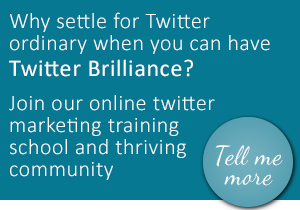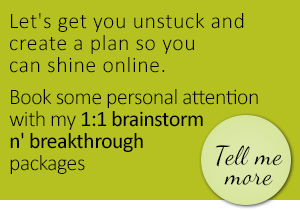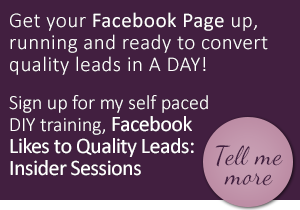Blog
How to read your ideal customers’ minds (using marketing tools you already use)
posted by Alicia in Strategy Stuff
 The best way to really understand your customers and prospects is to ASK and LISTEN. It’s the only way to learn their desires, needs, challenges, wants and dreams.
The best way to really understand your customers and prospects is to ASK and LISTEN. It’s the only way to learn their desires, needs, challenges, wants and dreams.
That means, you can make a profound connection through your marketing, and provide them with the solutions to their deepest desires and wants through your products and services.
(Did you know that all the big PR agencies conduct listening periods of at least a few months on behalf of their clients before creating an online marketing strategy? This is to better understand public sentiment around the brand.)
As a nubile micro-business there are SO many ways you can do this that are quick and free or low cost. And, they mostly use tools that you’re probably already using to market your business on the internet. Here are some of my favourites…
Social media as a listening tool
Popular social media platforms like Twitter and Facebook are heavy-laden with juicy insights about your ideal customers. It’s where everyone and her dog hang out to discuss their everyday, find solutions and recommendations for whatever they need. So how can you make the most of this information to benefit your business?
- Set up Twitter searches for keywords relevant to your business. These enable you to listen in and discover the needs of your audience. It’s like Google Search but reversed because it means you can listen in to discover what people are looking for (instead of them looking for you). No other social media platform has the search ability that helps YOU understand what your people want.
Some often used terms on Twitter are ‘can anyone recommend..?’ and ‘where can I buy..?’
Using these terms + your keyword to set up advanced Twitter searches will give you superhuman mind-reading capabilities!
- If you’re worried that you don’t have enough engagement on your Facebook Page, get curious about your community. Easy questions that ask people to choose preferences are perfect. For instance, if you’re an author you might ask: ‘Which do you prefer, reading digital books or a good old fashioned paperback?’
Keep your questions specific and mix in some playful ideas too – if your question is too broad all you’ll hear are crickets.
Some ideas to try:
What’s your favourite business book?
What’s your #1 goal this week?
How many emails in your inbox right now?
Asking questions to understand your audience isn’t just for Facebook – any social media channel will do – but Facebook’s design means there is plenty of room to elaborate in the answers, plus they’re all kept together in the same thread.
Host free Q&A tele or webinars
These are great fun and provide loads of value all round. The attendees learn from everyone else’s experiences which leaves them motivated and inspired. While you get valuable insight into what your audience struggle with or want. Plus you’ll hear the language they use to describe their desires – an added bonus when it comes to your marketing copy.
And, here’s an awesome tip… some of the tele and webinar conference providers (like Go To Webinar) gives you the option to ask the attendees questions when they register for your event.
2 or 3 simple questions can provide you with fascinating insights about who they are and what they want from you. These can be downloaded into a spreadsheet and used to form the basis of your event content. Plus, it can be used for understanding your audience needs long afterwards to help you serve them with solutions that they love (because they’ve told you so!).
Your Auto-responder sequence
Your subscriber list is a hotbed of potential new clients and customers. These people have taken positive action by opting in. That means they’ve made it clear that they want to hear about your products and services.
Not only that, when they first opt in, chances are they’re a little bit in love with you and ready to soak up all the good value-added content you have on offer.
NOW is the time to leverage that good feeling by asking them a question to help you understand them better.
I first heard this idea from Derek Halpern and it’s especially useful when your subscriber list is compact enough to handle the responses you’ll get (you’ll want to monitor what size that means for you over time). Because, it’s crucial that you respond to each reply. This an opportunity for you to continue the conversation and turn a prospect into a client, or at the very least create some hot love loyalty. Mmm!
Online surveys
Creating a successful survey requires some planning and thought, that doesn’t mean is has to be a complicated, drawn out process.
The first step is understanding your objective. What is it that you want to achieve?
Do you want feedback on a specific product? Is it an overall understanding of your customer base you’re after? Or, maybe it’s for planning purposes.
Next, you’ll want to consider the formatting, design, and wording of your survey. This will impact your response rate and the accuracy of your results – especially online.
Start your survey with broad questions before getting into the specifics, and leave collecting sensitive questions, demographic data or contact details until the end.
Don’t ask questions just for the sake of asking. Studies show that longer your survey, the less likely people will complete it so make each question count.
Talking of completion rates, you can offer an incentive to encourage completion of your survey – but this isn’t always a smart move. Yes, you will get more responses, but they are likely to be less accurate because the respondent is motivated by the incentive, not the survey itself.
Once your survey is ready, the final step before making it public is to test it to identify tech glitches or question misinterpretations. This is sooo important to ensure everything works out as you planned and to ensure you’re hard work pays off!
Ask your team, inner circle or better yet – a small number of your ideal audience to help you.
Check out some of my favourite online survey tools below:
PopSurvey: LOVE the high quality look. They bring the fun into short surveys which means a higher completion rate.
Survey Monkey: Probably the most popular – free and functional.
: Is the one I use most often. Not the best looking but free, and the data is stored in Google Drive along with all of my other documents, files and emails.
Over you to
Do you have a favourite way to read the minds of your customers? Share in the comments below so we can benefit and learn from eachother!
Get your actionable online marketing tips, delivered to your inbox each week - for free
Leave a comment Cancel reply
Did you know commenting on blogs has at least 5 benefits?
Check out my blog about it here!

Are you ready
to Dig-it-all?
If you think you haven't got time for social media and don't understand the latest marketing trends, you're in the right place.
Sign up for super speedy, bite-size tips delivered every week - for free.
-
Categories
-
Social Media & Online Marketing (140)
- Blogging & Content (14)
- Facebook (17)
- LinkedIn (2)
- Strategy Stuff (41)
- Twitter (48)
- Solid Productivity Tips (19)
-
Some Fascinating Stories (17)
- Case Studies (3)
- News (11)
- Press (3)
-
Social Media & Online Marketing (140)
-
Facebook



